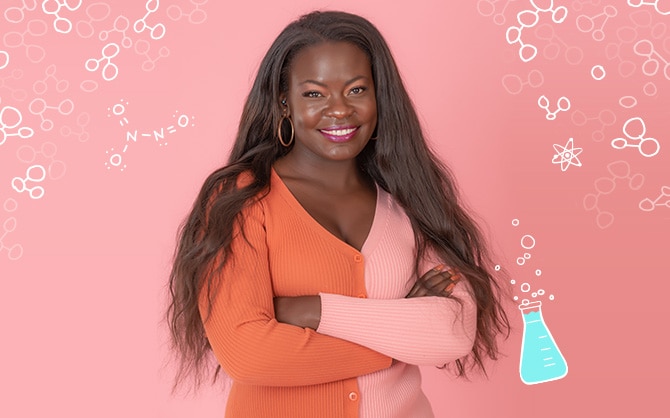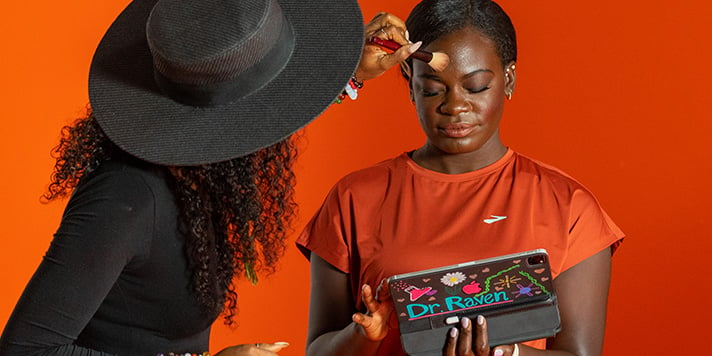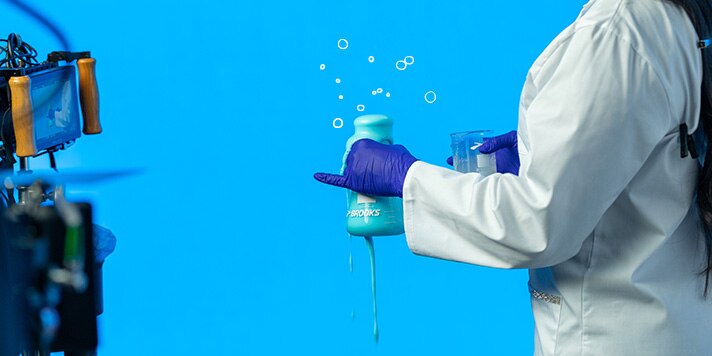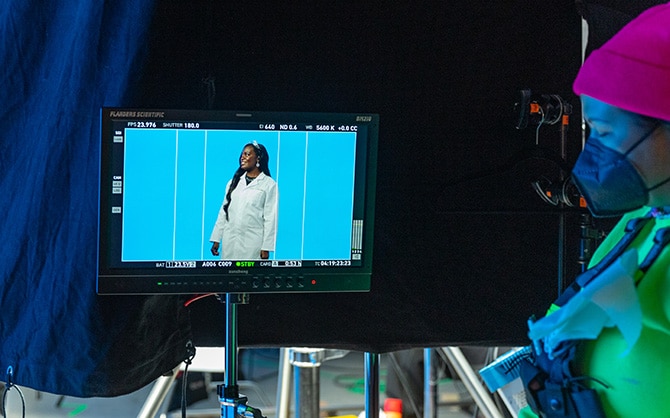Nitro-infuse your run with Dr. Raven the Science Maven

A molecular biologist, science communicator, and STEM educator discusses her love of science and takes us behind the scenes of some nitrogen-infused experiments.
Are you ready to Run on Nitro? We have you covered.
Nitrogen infusion is a process better known in non-running industries like coffee. At Brooks, nitrogen infusion allows you to get more without compromising - you can have more cushioning without the extra weight, or more resiliency without durability loss. This process allows us to tune cell structures and density to amplify and specifically tune the underfoot experience.
To help illuminate the science-y side of Run on Nitro, we worked with Dr. Raven Baxter - aka the Science Maven - on some nitrogen-infused experiments.
Dr. Raven Baxter is a scientist and fashionista on the Forbes 30 Under 30 list who often collaborates with NASA. She is a sought-after public speaker, most recently appearing on a panel for STARZ discussing Advancing Equity Across Industries and Finding Strategies for Better Representation. Her upcoming projects include a science-focused podcast and book. She recently has been published in Harper's Bazaar, Washington Post and Yahoo for her work in STEM advocation.
Watch Dr. Baxter break down the science behind our shoes, then read our conversation below.
Use the 'CC' option to add subtitles in your preferred language
Brooks: What is your science origin story? Why do you love science so much?
Dr. Baxter: I feel like I came out of the womb curious about the world around me. I was born a scientist. And let me tell you, Baby Raven was a character! I always wanted to know how things worked. Honestly, there was no point in time that I looked at myself and had the epiphany that I wanted a career in science. I just knew.
Though it surely irritated my mother, I was always mixing things from around the house that didn’t belong — like baby powder with nail polish and sugar — and doing little experiments just to see what would happen.
I love science so much because it holds the answers to the universe. Every day new mysteries of the world in medicine, the atmosphere, etc. are solved because of research conducted and theories proven by science.
I love science so much because it holds the answers to the universe."
Brooks: How did you choose molecular biology as your field?
Dr. Baxter: At Buffalo State, I took a genetics class to fulfill a requirement for my major and found it fascinating.
I immediately drew a parallel in my brain between languages and genes. Because I am fluent in both English and Spanish, I realized when I was learning genetics, it was like I was learning another language.
Genes have beginnings, middles, and ends in the way they’re coded into our bodies and that to me, was just like the structure of sentences. My love for molecular biology began with that revelation. I started studying molecules and was fascinated by the way they generate our life processes and connect us all as human beings.

Brooks: Can you give us a few examples of some women scientists that you think everyone should know about?
Dr. Baxter: There are so many! I think that the following are doing wonderful work:
Kizzmekia Corbett — Viral immunologist and Assistant Professor of Immunology and Infectious Diseases at Harvard T.H. Chan School of Public Health and the Shutzer Assistant Professor at the Harvard Radcliffe Institute.
Jennifer Doudna — An American biochemist who has done pioneering work in CRISPR gene editing, and made other fundamental contributions in biochemistry and genetics. She received the 2020 Nobel Prize in Chemistry, with Emmanuelle Charpentier.
Dr. Earyn McGee — She is doing wonderful things getting people talking about science and social justice issues (and having a lot of fun with her popular #FindThatLizard challenge on Twitter).
Alexis Nikole — Also known as The Black Forager, she sources her own flora for food and sings about it, sharing recipes and tips with her audience on YouTube.
Alie Ward — Uses her podcast to educate people on a variety of scientific topics and is one of the most approachable, supportive science communicators in the field.

Brooks: What advice do you have for young people who want to get into a science field? How about grownups?
Dr. Baxter: The same is true for both age groups: Be your unapologetic self and don’t let anyone tell you that your dreams are out of reach.
Brooks: Why is science relevant for everyone, not just the people who study it in academia?
Dr. Baxter: The truth is there are plenty of science roles to go around. You don’t have to work in a lab all day to be a scientist; many disciplines can benefit from people who are simply science curious. I believe that anyone interested in testing theories; asking questions about how the world works and discovering new things should follow their heart and soul into science.
If you’re excited about something, go with it. Have fun. One of the greatest misconceptions is that science is dry and boring. It’s quite the opposite - science is illuminating. Science is alive. Science is a part of all of us.
Brooks: What was your impression of the Brooks footwear development team?
Dr. Baxter: The team was a lot of fun. A very warm, friendly, creative group. I very much enjoyed collaborating with them!

Brooks: What most surprised you about the Brooks nitrogen-infusion process?
Dr. Baxter: I think that it was cool to see how the tools that scientists use in the lab to study diseases can also be used to help people run faster in their shoes!
Brooks: Why did you choose your specific nitrogen-infusion experiment in the video?
Dr. Baxter: I felt this demonstration would be easy for everyone to understand, while still providing a reaction in the traditional spirit of a lab experiment. It’s always exciting to watch chemicals interact this way.

Brooks: Were there any fun outtakes you can share or stories from the filming of the video?
Dr. Baxter: The production team let me use my own personal playlist, so there was a lot of dancing between takes. We also had some laughs in wardrobe, putting on a certain piece of clothing in a silly way and walking out to set wearing it as such to see if anyone would notice. Spoiler alert: they did!
Follow Dr. Raven
Thank you to Dr. Raven Baxter for taking us behind the scenes of our Run on Nitro experiments and for sharing her thoughtful words about science. Be sure to follow her on Instagram, Twitter, and YouTube, and see more of her work at scimaven.com.
Ready to Run on Nitro?
What will nitro bring to your run? Everything. And more. Brooks’ innovative nitrogen-infusion process amplifies your run for bigger benefits with zero compromises. Now in some of your favorite shoes, nitrogen-infusion unlocks a world of benefits for a super comfortable ride. Check them out below.
This is a carousel. Use next and Previous buttons to navigate.
